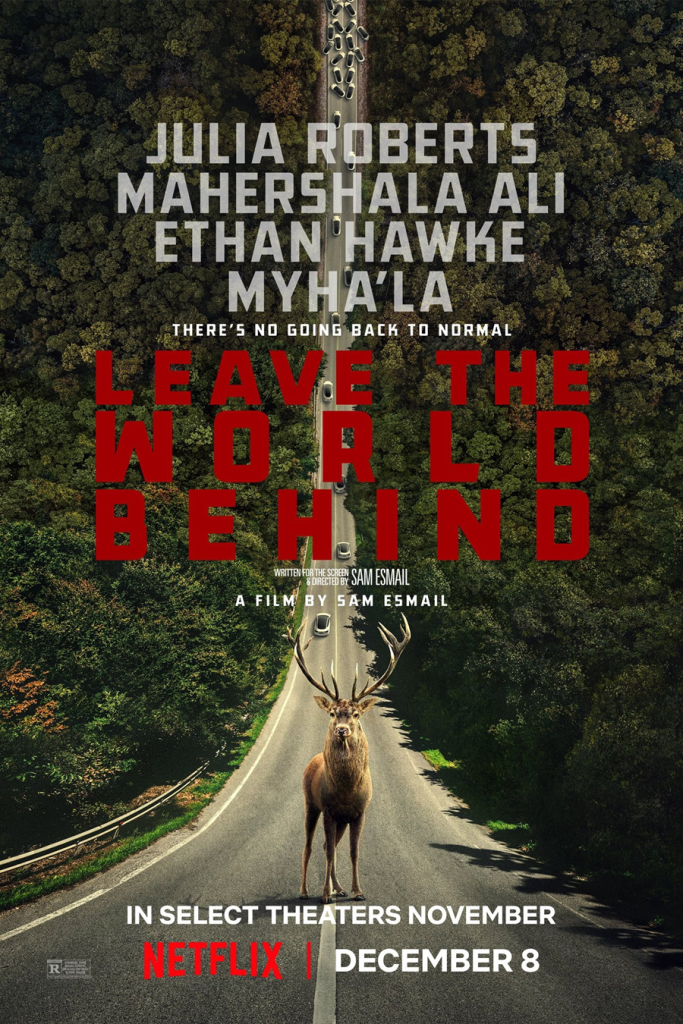Global Digital meltdowns loom, whether by cyberattack or system failure. At some point, THEY will test the system.
Mark Zuckerberg knows something we don’t. His mysterious Hawaiian bunker, rumoured to have escape tunnels and self-sustaining supplies, sparks apocalyptic theories. Yet, while the “Developed World” frets, Africa leads a culture with in-built crisis customization. Meet the continent built with pandemic-proof.
Like the Netflix thriller “Leave the World Behind,” where society unravels after a catastrophic event, speculation mounts over Zuckerberg’s fortress. Does the Meta CEO know impending disasters we don’t?

The families sharing a house in Long Island, NY, descend into primal fears as society unravels following unknown catastrophic events. Zuckerberg’s elaborate underground fortress being built now fuels speculation that the dystopian scenario may be prophecy, not fiction. Mainly since the movie was produced by the Obamas, a former American president and his wife.

Movies reflect society’s hopes, fears, and dreams. Sometimes, they anticipate the future, either by chance or extrapolating trends. For example, Contagion (2011) foreshadowed the Covid 19 pandemic. The Terminator (1984) foresaw drones and AI threats. Back to the Future Part II (1989) predicted wearables, video calls, and biometric scanners. This shows fiction becoming a reality.
Leave the World Behind: From Page to Screen
The 2020 novel Leave the World Behind became a hit Netflix film in 2023. Within an hour of its debut, 8.7 million pressed play. By Christmas Day, the movie could have had around 18.44 million streams.
The story follows two families forced to share a Long Island house after a mysterious crisis. As technology fails, the strangers warily cohabitate. Escalating phenomena and invasive wildlife heighten isolation and fray nerves. Class and race prejudices boil. Fragile civility gives way to uneasy alliances.

A pressure cooker exploring social tensions and primal fears. The thriller’s ambiguous ending implies such an attack would collapse any global superpower.
Let’s evaluate how Africa may survive a cyber-attack in 2024 in a hypothetical scenario.
The African Advantage
Conservative figures suggest that over 70% of the region lives rural. Moreover, urbanization does not imply the abandonment of rural areas, as many Africans maintain solid links and exchanges with their rural origins.
Power Failure
In the event of power failure, many Africans have the skills and knowledge to use natural resources, such as firewood, water, and plants, for their basic needs, such as cooking, drinking, and healing. We are also more resilient and adaptable to harsh and unpredictable conditions like drought, famine, and disease. For example, as of today, we continue to preserve meat, fish, fruits, vegetables, grains, and dairy products by drying, salting, smoking, fermenting, or storing them in clay pots.

Even without electricity to store beyond rudimentary refrigeration, Norwegian visitor Magnus watched awestruck as agile Maasai hands trimmed meat pounded herbs, and prepared aromatic stews in minutes. Old tricks ensured fresh ingredients lasted longer than the processed foods dominating European diets.
Community Cohesion
Africans possess stronger social bonds, providing support, security and solidarity in adversity. Scholars say that when a community has similar values, traditions, and practices, they become closer. Like this Ubuntu philosophy of being kind and working together. Also, when people depend more on nature for their lives, they learn to respect it more and live together peacefully.
As such, Africa could easily reset to early 1800s rural living if catastrophe struck. Tight-knit communities and ancestral wisdom equip Africans to handle social disruption that would fray the Western social fabric. Traditional bonds and environmental symbiosis form a societal survival toolkit the the so-called “Developed World” lacks.
Poor technological Integration
Africa has a lower level of digitalization and internet penetration. This makes it less attractive or vulnerable to cyber-attacks that aim to disrupt or steal data from online services, networks, or systems. We are more isolated and self-sufficient, with less dependence and interaction with the outside world.
The African Challenge
Humanitarian crises: Cyber-attacks may worsen the humanitarian situation in Africa. Our aid dependency, health, and education services may compromise the data and privacy of vulnerable populations or create new displacements or refugees.

Internal conflicts: African countries exploiting ethnic, religious, or political divisions, spreading misinformation or propaganda, maybe our biggest threat.
Africa has great potential and challenges in the face of a cyber-attack that could cause a global meltdown. While Africa has some advantages over other regions regarding its rural lifestyle, natural resources, and social cohesion, it also faces risks and drawbacks regarding our humanitarian crises, internal conflicts, and technological Integration.
Therefore, Africa needs to prepare and protect itself from cyber threats and impacts and seize the opportunities to survive in the event of a global system failure. Africa can survive a cyber-attack by relying on its strengths, overcoming weaknesses, and collaborating. Africa can also learn from the lessons and warnings of the movies and novels that depict such scenarios, such as Leave the World Behind and use them as a source of inspiration and reflection.

‘Maybe “Leave the World Behind” is just sheer entertainment brilliance of the producers – leaving the audiences spellbound and igniting controversy. It’s called Showbusiness!
What do you think?
- In your view, does Africa’s rural fabric and community cohesion better inoculate countries from sudden crises like cyber-attacks as we envisioned? How so?
- What examples have you witnessed firsthand of communities banding together amid collapse that display a lack of resilience in individualistic societies?
- Could intermittent power grid failures or internet shutdowns in African nations perversely better prepare consumers for infrastructure loss prevalent elsewhere?
- Does urbanization intrinsically erode survival capabilities as we grow over-reliant on technology, hierarchies and fragile order? How might societies balance interdependence with self-reliance?
- Should disaster continuity planning look different for poorer regions accustomed to periodic instability? How exactly?
- How has enduring volatility shaped African creativity, risk tolerance and cool-headedness under duress in your experience compared to Western panic?




